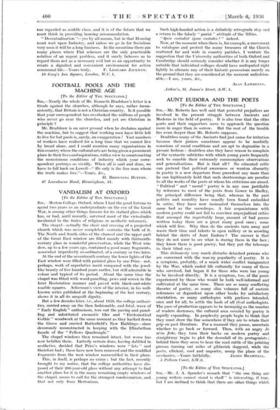AUNT EUDORA AND THE POETS
[To the Editor of THE SPECTATOR.]
SIR,—Mr. Roberts has well said that powerful prejudices are involved in the present struggle between Ancients and Moderns in the field of poetry. It is also true that the older poets and their supporters seem to approach the question more in anger than in sorrow. But the root of the trouble lies even deeper than Mr. Roberts supposes.
• Doubtless many of the Ancients find just cause for irritation
because their juniors sometimes appear- to be morbidly conscious of social conditions and are apt to dogmatise in a prosaic fashion : doubtless also they have reason to complain of the syntactic subtleties with which young poets frequently seek to ennoble their extremely commonplace observations and generalisations. But is that all ? No educated critic can pretend that political awareness or wanton obscurity in poetry is a new departure from precedent any more than he can legitimately hold that such shortcomings are peculiar to all the works of the poets at whom his criticisms are aimed.
" Political " and " moral " poetry is in any case justifiable
by reference to most of the poets from Gower to Shelley, the principal difference being that, whereas in the past politics and morality have usually been, found embedded in satire, they haye now insinuated themselves into the same bed as the snowdrops. A fair acquaintance with modern poetry could not fail to convince unprejudiced critics that amongst the regrettably large. amount of bad poems written today there are a great many good ones ; some which will live. Why then do the ancients turn away and waste their time and talents in open raillery or in scowling behind the skirts of Aunt Eudora ? The answer is that they do not want to see what is staring them in the face ; they know there is good poetry, but they put the telescope to their blind eye.
This dishonesty very much disturbs detached persons who are concerned with the wan ng popularity of poetry. It is a syniptan, probably, of a much wider conflict inaugurated by the. War,' which ended life culturally for many of those who survived, but began it for those who were too young -to' be involved directly. It a synaptiam, too, of the panic experienced by those who Would be both well-informed and cultivated at the same time. There are so many conflicting
theories of poetry, so many slim volumes full of esoteric references or dependent upon other' books for satisfactory elucidation, so many anthologies with prefaces intended, =once and Air all, to settle the hash of all rival anthologists. The pace of production appears to be increasing as the number of readers decreases, the cultural area coveied by poetry is rapidly expanding. In perplexity people begin to think that they must draw the line somewhere if they are to retain their grip on paSt literature. For a moment they pause, uncertain whether to go back or forward. Then, with an angry Je m'en fiche,-they turn their backs on modern poetry and straightway begin to plot the downfall of its protagonists ; behind them they seem to hear the mad rattle of the printing Tresses turning out miles of gibberish doggerel, while the poets, efficient, cool and unpoetic, usurp the place of the
5 l'elhan& Court, S.117.3.
















































 Previous page
Previous page